Written by Rebecca Turley
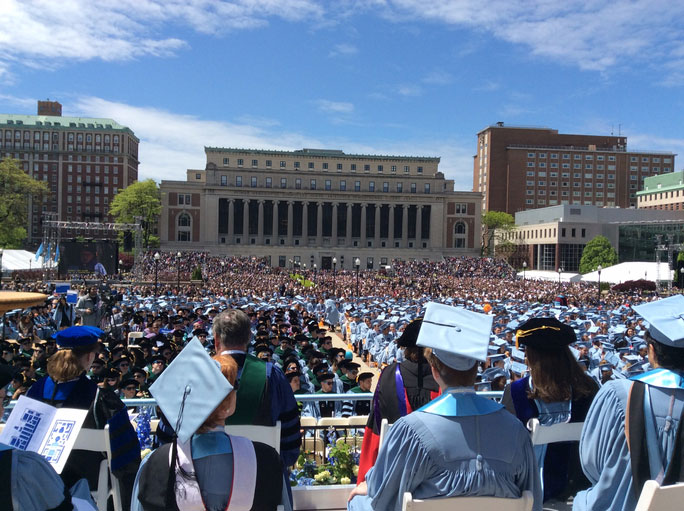
Despite salaries for social workers in New York City being among some of the highest in the nation, in March 2024, NYC Mayor Eric Adams announced plans to boost pay for human services workers throughout the metro area through a $741 million cost-of living adjustment. It’s a welcome raise for the 80,000-some human service workers in the city. And for newcomers looking at getting into the field, this is the sort of news that helps make the decision to get a degree and get started down the path even easier.
This investment covers human services workers in NYC working for nonprofit agencies, and is part of a new city cost-of-living adjustment that will equate to a pay raise of about 9.27 percent over the next three years.
This cost-of-living adjustment represents positive momentum towards a more level playing field for women and people of color, who represent the lion’s share of human services workers. Pay equity across race and gender is vital, particularly in a field that employs workers who are on the frontlines tackling pressing issues that affect the quality of life for all New Yorkers, and serving the resource needs for everyone from the unhoused population to asylum seekers.
“Human service workers are the hands and heart of New York City, providing 24/7 work that benefits all New Yorkers… human service work is often tiring and thankless, but the workforce is essential to our city.”
~ NYC Mayor Eric Adams
It’s an exciting time to become a social worker in New York City, which leaves just one question: How do you get there?
If becoming a licensed social worker in New York is in your future, then the Master of Social Work (MSW) is what you’ll eventually need to have on your resume. The New York State Education Department oversees the credentialing of social workers at two distinct license levels:
Licensed Master Social Workers (LMSW)
Licensed Clinical Social Workers (LCSW)
It’s a long walk to get to either one of these credentials. It will take you through an undergrad program and a significant amount of frontline experience where you’ll build your skills and earn your stripes in the real world of New York social services. But it’s a well-traveled path that’s easy to navigate with a little guidance, and that’s exactly what you’ll get here. Many have gone before you, and you can definitely get there too. We’re here to show you the way.
A BSW Provides the Most Streamlined Path to Earning an MSW and Becoming a Licensed New York Social Worker
Becoming a Licensed Clinical Social Worker (LCSW) authorized to provide clinical diagnosis and counseling is a two-step process. It starts by earning an MSW in order to qualify for the LMSW credential, then earning the LCSW after a few years of supervised practice in diagnosis and psychotherapy.
But the Licensed Master Social Worker (LMSW) isn’t just a stop on the way to becoming an LCSW. For many New York social workers, the LMSW is the end goal. It will prepare you for the kind of community-based work that many dream of when they think of becoming a social worker, outside of closed-door counseling sessions and out in the community where the rubber meets the road on the streets of New York City and suburban enclaves upstate.
Whether your goal is the LMSW, or advancing to clinical practice with the LCSW, you’ll need to set your sights on an MSW accredited by the Council on Social Work Education (CSWE).
If your CSWE-accredited MSW isn’t registered with the New York State Education Department (NYSED), it will be necessary to have your transcript submitted for review to make sure it includes all required coursework. As needed, you can complete additional coursework through pre-built course sequences offered locally to meet NYSED requirements.
How do you make your way to the MSW? There are a couple paths you may take:
- Earn a bachelor’s degree in a human services field (e.g., psychology, sociology, community mental health)
- Earn a Bachelor of Social Work (BSW)
You don’t need to earn a BSW to qualify for an MSW program, but it helps. Here’s why:
- A CSWE-accredited BSW programs include supervised field experience of at least 400 hours that allows you to begin putting classroom theory into practice. Internship experiences may include working in mental health clinics, child and family service agencies, policy organizations, hospitals, community health clinics, and more.
- A CSWE-accredited BSW provides a generalist foundation in social work that is the same as the first year of an MSW program. With a BSW, you would qualify for advanced-standing admissions in your MSW program, which means earning your MSW in as little as one year instead of two. This is an important consideration for any would-be social worker thinking about saving time and money while preparing to become an LMSW or LCSW.
So, even if you don’t go on to earn an MSW right away, or decide not to earn one at all, the BSW will prepare you to assume a variety of non-licensed positions in the field. That means you’re job-ready, and able to start accumulating valuable experience while getting paid with the option of earning an MSW later if you choose.
Fortunately, there are plenty of schools in New York City that offer the BSW, such as the College of Staten Island – CUNY, Medgar Evers College – CUNY, Lehman College – CUNY, New York University, and Fordham University.
While a bachelor’s degree in a related field like sociology or psychology can provide you with a solid foundation for future MSW study, only a BSW’s comprehensive study of social work within a generalist framework qualifies you for an Advanced Standing MSW.
Which brings us to the different types of MSW programs available:
- Advanced Standing MSW: Advanced Standing MSW programs, which are reserved only for BSW holders who graduated from a CSWE-accredited program, are often just one year in duration.
- Traditional MSW: Traditional MSW programs are about two academic years in duration and are designed for students who completed a bachelor’s degree in a human services or behavioral health field.
- Accelerated MSW: Accelerated MSW degrees are just 16 months in duration. These programs are designed for non-BSW holders looking for a condensed and intensive course of study leading to the MSW.
All CSWE-accredited MSW programs include at least 900 hours of supervised field instruction as part of the degree requirements.
James Russell Dumpson, Former Dean of Fordham University’s School of Social Work and Civil Rights Icon
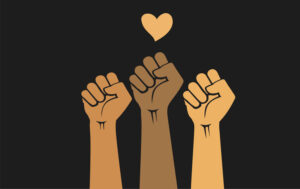 James Russell Dumpson (1909-2012) was a famed New York social worker, activist, educator, advisor, and advocate for social good. He began building his legacy early in his career as a caseworker for the Philadelphia Department of Public Welfare.
James Russell Dumpson (1909-2012) was a famed New York social worker, activist, educator, advisor, and advocate for social good. He began building his legacy early in his career as a caseworker for the Philadelphia Department of Public Welfare.
But it wasn’t until 1959 that he began garnering attention for his work on a larger scale. It was then that he was named the Commissioner of Welfare for NYC – the first time a social worker had held that position. During this time, he was the only Black welfare commissioner in the nation. His tireless work helped shape the future of civil rights and racial equality.
Dumpson went on to become the Dean of Fordham University’s School of Social Work, making him the first Black deans of a non-HBU (Historically Black University) school of social work.
His reputation caught the attention of leaders on a national scale, and he served on a number of advisory commissions, including the Presidents Commission on Narcotics and Drug Abuse. He also worked in an advisory capacity for Presidents Kennedy and Johnson. Much of his later work was focused on the impact of HIV/AIDS on communities of color, the plight of the urban minority elderly, and fighting to reform New York City’s child welfare system. Dumpson was a true civil rights hero and Renaissance man.
Other Considerations When Gearing-Up to Earn Your MSW at One of New York’s Esteemed Schools of Social Work
Many colleges and universities offer a number of options within the MSW:
- Online or on-campus (or a blend of the two): Not all MSW programs are offered in a traditional, on-campus format. The CSWE also accredits online programs and those offering a hybrid format that combines both online and on-campus coursework. Online programs allow students to complete some or all of their coursework through remote learning. For example, Touro University offers their MSW in both an on-campus and fully online format, while Fordham University’s MSW can be completed on-campus, online, or through a hybrid format.
- Part-time or full-time: Most programs are also offered in a part-time format to accommodate students with professional and personal responsibilities.
- Specializations: MSW programs not only prepare students to begin developing the clinical or generalist skills they’ll need in practice, they are also where you get a chance to study in your chosen area of specialty.
For example, Columbia University’s MSW includes options to specialize in advanced clinical social work practice, policy practice, advanced generalist practice & programming, or leadership management and entrepreneurship for social justice. And students of Yeshiva University’s MSW have the option of earning a certificate in one of seven areas of study: MSW/CASAC (credentialed alcohol and substance abuse counselor), gerontology & palliative care, school social work, creative arts and healing, trauma-informed practice, generalist social work, or social work with the military. - Dual degrees: Some universities offer dual degrees that allow students to earn another graduate degree alongside their MSW. For example, Stony Brook University offers an MSW/MA in Medical Humanities, Compassionate Care and Bioethics; an MSW/MPH; and an MSW/JD. And Columbia University offers no less than eight dual degree options.
Degrees by Borough in New York City
New York City has no shortage of colleges and universities offering CSWE-accredited BSW and MSW programs throughout the five boroughs:
Schools in The Bronx Offering CSWE-Accredited Social Work Degrees
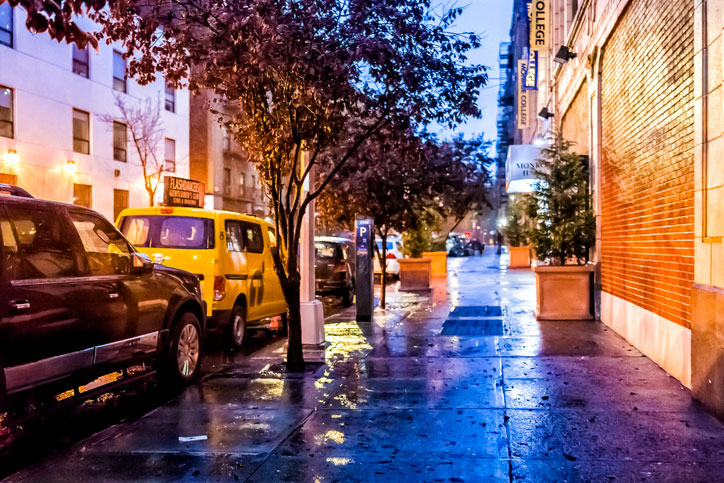
Someone once said that social workers are like the Swiss-Army knives of the human services profession, and it couldn’t be truer. With their hands in nearly all pressing social issues facing New York City, they’re a key part of frontline teams delivering vital services focused on housing, food access, healthcare, safety, drug rehabilitation and prevention, and more. They’re also ardent voices in policy making and legislation, shaping the future of services and resources offered to the most vulnerable people. It all starts with a BSW or MSW degree. Or both.
Social Workers with Montefiore’s Health System Address Patient issues that Traditional Medicine Can’t Fix
Montefiore’s new program, called the Community Health Worker Institute, seeks to address one of today’s most pressing social problems — access to healthcare services even for those who can’t afford it. Launched in 2021, to date, the program has helped more than 7,000 patients.
You’ll also find community health workers here to bridge the gap between medicine and social services. Just ask Marilyn Perez, a Bronx resident whose mold-ridden apartment triggered a COPD episode. Struggling to navigate the complexities of the public housing system, Perez turned to one of Montefiore’s community health workers, who was able to connect her with the appropriate people to make a change.
Montefiore’s program is among a number of growing initiatives designed to help at-risk and vulnerable populations in the Bronx access the resources and services designed to improve their health and well-being.
With opportunities on the rise, now is the time to begin thinking about earning the degree in social work that will either kickstart your career or take it to the next level.
Earning the Bronx-based BSW and MSW That Will Propel Your Career in Social Work
It’s an exciting time to become part of Montefiore’s Community Health Worker Institute and the other exciting programs in the Bronx and elsewhere across the NYC metro area.
Entry into this field begins with a degree.
The Bachelor of Social Work (BSW) is the widely recognized entry-level degree in the field of social work, and you can land some pretty great jobs with it.
If you want to become a licensed social worker in New York State, you’ll need to first earn an MSW that’s accredited by the Council on Social Work Education (CSWE) and then earn licensure through the New York State Education Department.
The credentialing of clinical social workers in New York is a two-step process that first includes earning licensure as a Licensed Master Social Worker (LMSW) and then completing three-years of supervised experience in diagnosis and psychotherapy to be licensed and registered to practice as a Licensed Clinical Social Worker (LCSW).
Of course, you don’t have to go on to earn the LCSW, and in fact, many social workers in the Bronx and throughout New York choose to stick with the LMSW. The main difference is that the LCSW allows you to provide clinical counseling services including diagnoses and talk therapy used to treat certain common mental health and behavioral problems.
In either case, you can earn an MSW by either (1) earning a bachelor’s degree in a human services field like community mental health, psychology, or sociology and then earning a traditional, two-year MSW, or (2) earning a Bachelor of Social Work (BSW) first, and then completing an advanced-standing MSW that takes just one year to complete.
Hip-Hop’s Legacy in Social Justice
‘‘Got to give us what we want/Gotta give us what we need/Our freedom of speech is freedom or death/We got to fight the powers that be!’’
– Public Enemy, ‘‘Fight the Power,’’ 1990.
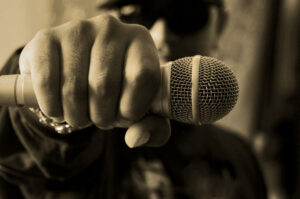 Social and racial justice – it’s long been a recurring theme in hip-hop. For more than 50 years, it’s given artists a platform for railing against systemic injustice.
Social and racial justice – it’s long been a recurring theme in hip-hop. For more than 50 years, it’s given artists a platform for railing against systemic injustice.
And the birthplace of this cultural expression? It’s the Bronx. It only makes sense; the Bronx was a tangle of post-war racial discrimination, segregation, and sheer animosity in the 1970s. It all culminated in what historians now refer to as the “Decade of Fire” — a time when landlords routinely set fire to run-down properties in hopes of claiming the insurance money. Those actions ultimately displaced an estimated quarter million black and Puerto Rican residents in the South Bronx.
In the decades since, hip-hop has circled the globe a thousand times, stirring the hearts and minds of billions of people over three generations and generating billions of dollars in the process.
But for many artists, hip-hop was and still is about free expression, providing those who otherwise would be voiceless with a strong and resonating platform to provide commentary on violence, corruption, injustice, and systemic racism.
There are two schools of social work in the Bronx offering CSWE-accredited programs:
Lehman College CUNY
School of Health Sciences Human Services and Nursing
Bronx, NY

MSW (on-campus)
Also Offers:
- BSW
CUNY’s Lehman College is home to a legendary social work school that includes both BSW and MSW degrees. The MSW program, designed to equip students with advanced clinical skills and leadership capabilities, features full-time, part-time, and advanced standing (for BSW holders) formats. Lehman’s commitment to experiential learning is reflected in its extensive fieldwork opportunities, which include placements in hospitals, schools, and community organizations throughout New York. Students benefit from small class sizes, personalized instruction, and a curriculum that emphasizes social justice, cultural competence, and evidence-based practice.
Mercy University
School of Social & Behavioral Sciences
Bronx, NY (other location in Dobbs Ferry and Manhattan)

BSW (on-campus)
Though the main campus location for Mercy University is located in Dobbs Ferry, it also has a satellite campus right here in the Bronx.
Social Work Schools in Brooklyn Offering Online & On-Campus BSW & MSW Programs
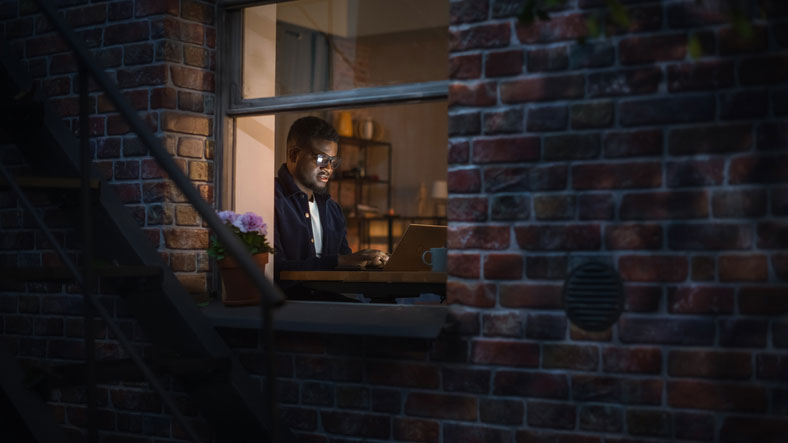
Everyone who lives here in Brooklyn knows it’s amazing. From the Brownstones along tree-lined streets to the hamminess of Coney Island… Brooklyn is brimming with the kind of love and community that’s made people want to put down roots here for generations. Despite all the borough has going for it, social issues like homelessness, drug abuse, and mental illness are persistent and pervasive.
It only makes sense. With nearly 2.7 million living here, Brooklyn is NYC’s most populous borough, and it continues to grow. In the last decade alone, the population here has increased by nearly 10 percent. A lot of that new blood has brought in new money, gentrifying the borough and pushing real estate prices higher.
For the ordinary folks here whose incomes haven’t kept pace with it all, poverty is still a very real thing. Very nearly 18 percent of the people here live below the poverty line, second only to the Bronx. It also leads all of NYC’s boroughs for the number of children living below the poverty line – about 580,000. Access to healthcare, affordable housing, and food insecurity are just some of the serious issues facing many Brooklyn residents.

Social workers here in Brooklyn are working hard to hold the social safety net tight. And the strength to do it comes with the kind of knowledge and skill you can only get from a degree in social work.
If You Choose to Serve the People of Brooklyn as a Licensed Social Worker, an MSW is in Your Future
It’s entirely possible to find your niche in Brooklyn’s social work professional community with an undergraduate degree. Everything from general outreach work in the community to the vital administrative work on the back-end that keeps everything clicking would be on the table. But the kind of up-close-and-personal counseling, domestic intervention, and case management work that most people think of when they set their sights on a career in social work requires a state license. And that license requires a Master of Social Work (MSW) degree.
The New York State Education Department oversees credentialing for Licensed Clinical Social Workers (LCSW) and Licensed Master Social Workers (LMSW) in the Empire State. The LMSW comes first, followed by the LCSW following a period of supervised experience in diagnosis and psychotherapy. Both licenses require you to hold a Master of Social Work (MSW).
There are two paths to earning an MSW: (1) earn a bachelor’s degree in a human services field like community mental health, psychology, sociology, or health and human services, and then complete a traditional, two-year MSW; or (2) build on a Bachelor of Social Work (BSW) that provides you with an advanced-standing status that allows you to earn your MSW in as little as one year.
NYC has no shortage of BSW and MSW programs offered through nationally renowned schools of social work, some of which are located in Brooklyn:
Long Island University, Post & Brooklyn Collaborative
School of Health Professionals
Brookville, NY

MSW (on-campus)
Also Offers:
- BS in Social Work
- Doctorate of School Work
The Long Island University MSW program is a unique collaboration between LIU Post (Brookville) and LIU Brooklyn, offering students courses, resources, services, and a coalition of faculty from both locations. This outstanding graduate program allows students to specialize in one of five areas: substance use and addictive behaviors, child and family welfare, forensic social work, gerontology, or nonprofit management. Varied fieldwork experiences ensure a well-rounded academic experience, and the design of the program’s curriculum also prepares students to earn the New York Certification in Alcohol and Substance Abuse Counseling (CASAC) designation and advanced state certification in forensic social work.
Touro University
Graduate School of Social Work
New York, NY
(other location in Manhattan, NY)

MSW (on-campus, online)
Offering both an in-person cohort and a fully online program, Touro University’s MSW is designed with flexibility in mind. Students of this program can also choose from a part-time, full-time, or 16-month accelerated format. The traditional MSW boasts courses in the evenings and on the weekends, while the online format can be completed entirely online. Specialization options, which include The Aging Population, Social Work in Schools, and Mental Illness, provide students with opportunities to distinguish themselves in the field and gain valuable experience with underserved and vulnerable populations.
Long Island University – Brooklyn
School of Health Professions
Brooklyn, NY

MSW
Also Offers:
- BS in Social Work (BSSW)
- Doctorate of School Work
Long Island University Brooklyn’s BS in Social Work prepares students to participate in careers in social work and other human services field and provides aspiring social workers with a solid foundation that allows them to assume advanced-standing positions in MSW programs offered at schools like LIU. Just some of the perks of this program include a flexible curriculum with classes offered on the weekdays and weekday evenings, career planning and placement assistance, and small class sizes for individualized learning.
Medgar Evers College, CUNY
Social Work Department
Brooklyn, NY

BS in Social Work (BSSW) (on-campus)
The Medgar Evers College, the youngest four-year senior college in the City University of New York, offers the BS in Social Work. This program is built on a liberal arts foundation and features a challenging, generalist curriculum that includes courses in research, social work practice, field education, social and economic justice, and more. This program is designed to prepare students for entry-level positions in social services organizations or for the MSW. In addition to the program’s core curriculum, students here have the option to specialize in child welfare, substance abuse, or gerontology.
CSWE-Accredited Online & On-Campus Social Work Degrees in Manhattan
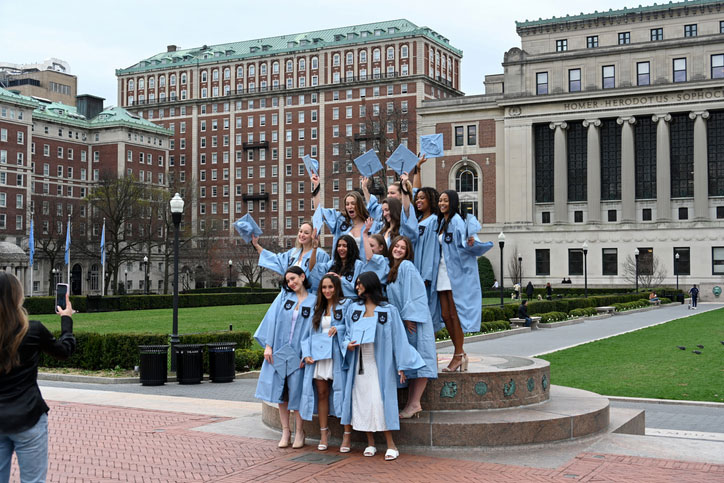
Social workers empower communities to make change. Their role in society continues to grow, both in Manhattan and throughout NYC, thanks to new insight into the value of social services and the growth of many initiatives aimed at helping underserved and at-risk communities throughout the city.
The Big Plan to Assign a Social Worker to Each of Manhattan’s 77 NYPD Precincts
For example, City Council members like Erik Bottcher (D-Manhattan) are pushing for more social workers within the NYPD. Specifically, they want to see at least one social worker stationed at every one of the NYPD’s 77 precincts. In May 2024, Bottcher introduced legislation that would make this a reality, requiring the Department of Health and Mental Hygiene to oversee the placement of social workers at precincts throughout the city. It’s the hope of City Council members that doing so would help people break the arrest-release cycle.
NYC has already begun experimenting with pilot programs that involve bringing social workers to 9-1-1 calls for mental health emergencies. Now, City Council wants them to become part of the civilian workforce of the NYPD. If passed, the legislation would allow social workers to evaluate individuals for substance abuse and mental health disorders and connect them with follow-up resources and services.
As a result of an increase in new and proposed initiatives like this, degrees in social work are growing in popularity, providing the training it takes to make a career out of advancing the social good in areas like child welfare, immigration, mental health, and substance use disorder counseling.
Earning the BSW or MSW Designed to Open Doors to Social Work Careers in Manhattan
Where does a career in social work begin? For many, it’s the Bachelor of Social Work (BSW), which serves as a solid foundation for many careers in the field. But if you want to position yourself for the most patient-centered roles at the micro level of social work practice or the most influential ones at the macro end of the spectrum, then the Master of Social Work (MSW) should be a top priority.
The New York State Education Department oversees credentialing for Licensed Clinical Social Workers (LCSW) and Licensed Master Social Workers (LMSW). In both cases, you’ll need to earn a Master of Social Work (MSW) accredited by the Council on Social Work Education (CSWE).
(You’ll need to earn an LMSW license first and then complete a period of supervised experience in diagnosis and psychotherapy to be licensed and registered to practice as an LCSW.)
There are two, major routes to earning the MSW that will qualify you for New York’s MCSW or LMSW:
(1) Earn a bachelor’s degree in a human services field (e.g., community mental health, psychology, sociology, health and human services, etc.) and then complete a traditional, two-year MSW.
OR
(2) Earn a Bachelor of Social Work (BSW) that provides you with an advanced-standing status that allows you to earn your MSW in just one year.
Whether you’re just beginning your education in social work or are looking to earn the CSWE-accredited MSW that will lead to state licensure, you have a number of options available to you in Manhattan:
Columbia University
Columbia School of Social Work
New York, NY

MSW (online, on-campus)
Also Offers:
- PhD in Social Work
Columbia University has long been heralded as a leader in social work, education, and training. Today, it continues its legacy of academic excellence in social work by offering both an on-campus and online MSW. Specialization is central here, with students able to complete their MSW by choosing:
- A platform (two-year, full-time residential program, online program, 16-month program, advanced standing, part-time, five-term international, or one-year residency)
- A social work specialization (advanced clinical social work practice, policy practice, advanced generalist practice & programming, or leadership management and entrepreneurship for social justice)
- A specialized programming track (DBT program or accelerated policy practice)
- And an optional dual degree or minor (eight dual degrees and three minor options)
Fordham University
Graduate School of Social Service
New York, NY (other locations include Westchester and Long Island)

MSW (on-campus, online, hybrid)
Also Offers:
- BASW
- MSW/JD
Ranked among the top MSW programs in the nation by U.S. News & World Report, Fordham University’s MSW boasts a contemporary curriculum and options to complete it through a traditional, on-campus format or in a fully online or hybrid format. Students of this program enjoy opportunities for scholarships and fellowships, including the Palliative Care Fellowship and the PIPELINE for Youth Health Fellowship Program. Students choosing the on-campus program also have the option of earning a specialized practice certificate in either health or crisis and resilience alongside their MSW.
Hunter College CUNY
Silberman School of Social Work
New York, NY

MSW (on-campus)
Also Offers:
- MSW
- MSW-MsEd
- PhD in Social Welfare
Established in 1958, the Samuel J. Silberman School of Social Work is the oldest and largest public school of social work in New York, and the MSW is its crown jewel. Students here choose from a two-year, traditional program; a one-year residency program for full-time social workers; an advanced standing program for students who completed a BSW; an accelerated, full-time program of 18 months; and an accelerated, one-year residency program.
New York University
Silver School of Social Work
New York, NY

MSW (on-campus, hybrid)
Also Offers:
- BSSW
- DSW
- PhD in Social Work
New York University’s MSW boasts a flexible design that allows students to earn their graduate degree in a traditional, full-time format; a 16-month accelerated format; an advanced-standing format for those with a BSW; through part-time and extended formats; or in a hybrid, part-time format. The Silver School also offer a truly unique MSW program with a study abroad option in Shanghai, the only MSW program offered by an American university in China. Students here study in both Shanghai and New York, thereby allowing them to study economic, cultural, and social similarities and differences between the two countries. This global MSW consists of both a generalist practice curriculum in Shanghai (with bilingual opportunities) and a specialized practice curriculum in NYC for a truly immersive experience.
Stony Brook University SUNY
School of Social Welfare
New York, NY
(other location in Stony Brook)

MSW (on-campus)
Also Offers:
- BSW
- MSW/MA in Medical Humanities, Compassionate Care and Bioethics
- MSW/MPH
- MSW/JD
- PhD in Social Welfare
Stony Brook University brings its famed MSW program to Manhattan. Students of this program specialize in one of three areas: community, policy, and political social action; families, youth, and transition to adulthood; and integrated health: physical, psychological, and social well-being. Stony Brook is connected to Stony Brook University Hospital in Long Island. It also sponsors the Sayville Project, a nonprofit community-based organization that provides field-based care management support and services to adults with severe and chronic physical and mental health conditions. MSW students volunteering with this program enjoy outstanding opportunities to familiarize themselves with the New York State Department of Health, the New York State Office of Mental Health, and the Suffolk County Division of Community Mental Hygiene, all of which serve as overarching agencies for the program.
Touro University
Graduate School of Social Work
New York, NY
(other location in Brooklyn)

MSW (on-campus, online)
Offering both an in-person cohort and a fully online program, Touro University’s MSW is designed with flexibility in mind. Students of this program can also choose from a part-time, full-time, or 16-month accelerated format. The traditional MSW boasts courses in the evenings and on the weekends, while the online format can be completed entirely online. Specialization options, which include The Aging Population, Social Work in Schools, and Mental Illness, provide students with opportunities to distinguish themselves in the field and gain valuable experience with underserved and vulnerable populations.
Yeshiva University
Wurzweiler School of Social Work
New York, NY

MSW (on-campus, online)
Also Offers:
- DSW
- PhD in Social Welfare
For nearly 70 years, Yeshiva University has been a national leader in social work education, and their MSW continues this legacy of excellence with outstanding options to specialize through your choice of platform, practice method, and optional certificate. Available as both a traditional and advanced standing program for students who have earned their BSW, Yeshiva’s MSW comes complete with your choice of an on-campus, online, or live virtual classroom format… your choice of clinical focus on individuals and families, group work, or community practice… and options to specialize your program with a certificate in one of seven areas of study:
- MSW/CASAC (credentialed alcohol and substance abuse counselor)
- Gerontology & palliative care
- School social work
- Creative arts and healing
- Trauma-informed practice
- Social work with the military
Social Work Schools in Queens Offering CSWE-Accredited Online & On-Campus Degrees
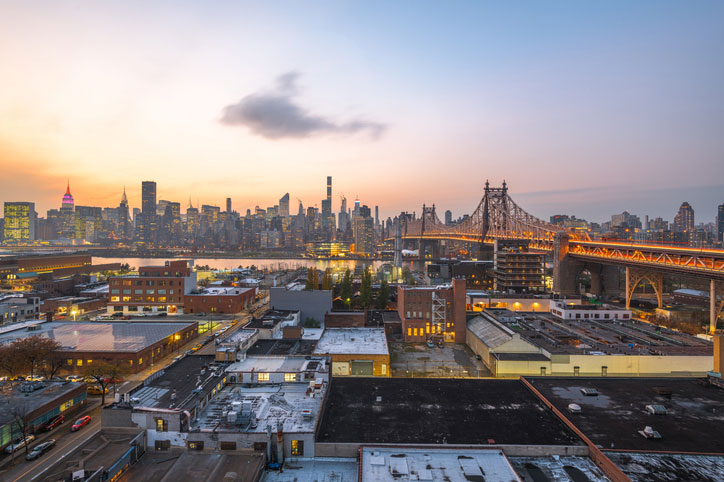
When it’s your job to help marginalized people, groups, and communities receive quality healthcare, mental health treatment, substance abuse counseling, housing assistance, and more, you don’t expect to be able to do it well without a lot of education and experience — both of which come by way of earning a BSW, MSW, or both.
Ask any social worker in Queens and they’ll tell you that among all these issues, the persistent barrier to health equity is the topic of the year. The good news is that community health organizations and social workers in places like East Harlem are getting the funding they need to tackle this growing problem.
Big Name National Organizations are Putting Up the Funds to Save Lives in Queens
Through their Social Impact Funds, the American Heart Association is providing funds to improve health inequity in Queens. As of February 2024, they’ve committed to distributing $500,000 to four social enterprises in NYC that are focused on breaking down the barriers to maintaining cardiovascular health.
Strong Children Wellness in the Queens neighborhood of Jamaica, one of the recipients of these funds, has created an integrated healthcare network that provides a myriad of social, physical, and mental health services to children and families in under-resourced communities.
Initiatives like these help fuel the dynamic social services field in Queens, but it’s the social workers behind the work that’s getting done that are making real inroads in leveling the playing field.
Right now is a fantastic moment in time to become part of the solution for the people of Queens. But before you can begin making a difference, you’ll need the right kind of education.
Earning the BSW or MSW That Will Help You Make a Difference in Social Work
The social work profession is a vast one, comprising hundreds of organizations and entities in the public, private, and nonprofit spheres based in New York City alone. The Bachelor of Social Work (BSW) is an excellent entry point into the field, providing many individuals with the credentials needed to land jobs in substance abuse treatment facilities, community agencies, homeless shelters, halfway houses, and much, much more.
But if you’re looking to practice clinical social work, which includes diagnosing, counseling, and providing therapies and treatment, you’ll want to earn a Master of Social Work (MSW) and state licensure to practice in New York State.
The New York State Education Department is the agency responsible for credentialing Licensed Clinical Social Workers (LCSW) and Licensed Master Social Workers (LMSW).
If you’re interested in community outreach work that doesn’t involve group and one-on-one counseling, then the LMSW license is where you want to set your sights.
If you’re interested in clinical social work, where you’ll be diagnosing and treating common behavioral disorders and mental health problems through counseling, then the LCSW is what you’re aiming for. This involves a two-step licensure process that starts by earning an LMSW and then completing about three years of supervised experience in diagnosis and psychotherapy in order to become an LSCW.
To earn licensure as either an LMSW or LSCW in New York State, you must earn an MSW that’s been accredited by the Council on Social Work Education (CSWE). The path to earning an MSW may include first earning a Bachelor of Social Work (BSW) and then completing an advanced-standing MSW program that can be completed in just one year. This means if you’re just getting started, a BSW is the right place start.
But if you’ve already earned a bachelor’s degree other than a BSW in any human services field, then it’s time to start looking at traditional, two-year MSW programs.
Social Justice and Advocacy in Queens
 Nonprofit and community organizations in Queens highlight some of the outstanding work aimed at social justice taking place in NYC.
Nonprofit and community organizations in Queens highlight some of the outstanding work aimed at social justice taking place in NYC.
Queens Community House
Queens Community House is focused on supporting positive change through advocacy and social justice efforts. Throughout its 100-plus-year history, the Queens Community House has worked on inspiring change through programs focused on immigrant rights, affordable housing, financial justice, and access to parks and green spaces.
Queens Community Justice Center
The Queens Community Justice Center works to keep people out of the justice system by creating stronger communities. This nonprofit works with family courts to provide community-based diversion programs and other alternatives to incarceration for people charged with low-level offenses. The Center provides case management services, as well as individual and group counseling and work development resources and services.
New York City Family Justice Center, Queens
The New York City Family Justice Center in Kew Gardens is part of the Family Justice Center Alliance (FJCA), a program of HOPE International, one of nation’s leading organizations focused on domestic violence and sexual assault prevention. Their efforts are focused on creating innovative approaches to meeting the needs of survivors of domestic violence, sexual assault, child abuse, elder abuse, and human trafficking.
Queens is home to two schools that offer CSWE-accredited programs at both the undergraduate and graduate levels that will meet the requirements for licensure in New York:
York College CUNY
Department of Social Work
Jamaica, NY

MSW (on-campus)
Also Offers:
- BSSW
York College’s MSW program is designed to equip students with the skills necessary to transform lives through healthcare-focused social work. With an emphasis on affordability and accessibility, students benefit from a diverse and culturally rich learning environment. The program prepares students to serve as healthcare-focused social workers in underserved communities. Students engage in rigorous coursework and hands-on field experiences, supported by a dedicated faculty committed to social justice and civic participation. The program offers comprehensive preparation for the New York State LMSW exam, ensuring graduates are well-equipped for professional licensure and practice.
CSWE-Accredited Online & On-Campus BSW & MSW Programs in Staten Island
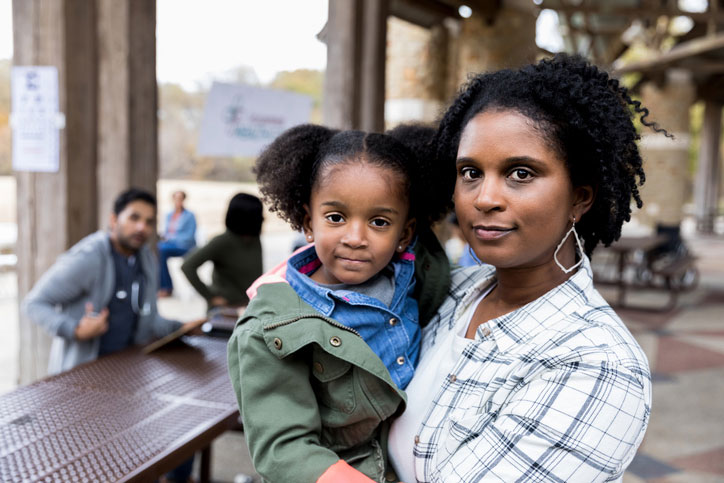
Opioid settlement funds are finally making their way to Staten Island, giving social services agencies and the social workers who work for them much-needed funding to provide lifesaving care.
$12 Million in Funding Earmarked for Addiction Treatment in Staten Island
In December 2023, Mayor Eric Adams committed $12 million in funding over the next four years to Staten Island organizations focused on addiction treatment and prevention. This funding, funneled down from the opioid settlement awards earned from lawsuits brought by the NYS Attorney General, will go to agencies involved in treatment, outreach, and harm reduction, as well as to agencies focused on issues like housing and employment assistance.
Major funding like this helps social service organizations throughout the borough expand their services and resources to help more people affected by the ongoing opioid epidemic. As a result, social workers in public, private, and nonprofit agencies are enjoying more opportunities than ever before, both in Staten Island and across the NYC metro area.
For many, this means that there’s no better time than now to begin thinking about the degree it takes to launch a career in social work, or take it to the next level.
Earning the BSW or MSW That Will Turn Your Drive to Help the People of Staten Island Into a Reality
Social work degrees are growing in numbers, with a variety of colleges and universities now offering programs designed for either aspiring or practicing social workers. The Bachelor of Social Work (BSW) remains an outstanding starting point for a social work career, with a host of job opportunities available to BSW graduates in community centers, homeless shelters, substance abuse treatment facilities, and halfway houses throughout Staten Island.
But if you want to engage in the clinical practice of social work, you’ll need to earn a Master of Social Work (MSW) to qualify for state licensure.
The path to becoming a social worker in Staten Island requires earning an MSW that’s accredited by the Council on Social Work Education (CSWE). You can earn an MSW one of two ways:
- By earning a bachelor’s degree in a human services field (e.g., counseling, psychology, sociology) and then completing a traditional, two-year MSW
- By earning a BSW, which then qualifies you for an advanced standing MSW that takes about one year to complete
Whichever path you choose, you’ll need an MSW to earn licensure through the New York State Education Department as a Licensed Clinical Social Worker (LCSW) and Licensed Master Social Worker (LMSW). The LMSW is earned upon completion of the MSW, and the LCSW is then earned after an additional three years of supervised experience in diagnosis and psychotherapy.
Sandra Bernabei: Championing Social Justice in NYC
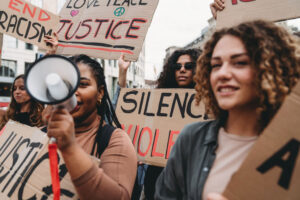 Sandra Bernabei is synonymous with social work in New York City. Former president (2014-16) of the NYC Chapter of the National Association of Social Workers, Bernabei’s influence reverberates throughout the city. Her work is extensive, encompassing private practice, director positions at both Barnard College and Columbia University, and many community advocacy positions over the years.
Sandra Bernabei is synonymous with social work in New York City. Former president (2014-16) of the NYC Chapter of the National Association of Social Workers, Bernabei’s influence reverberates throughout the city. Her work is extensive, encompassing private practice, director positions at both Barnard College and Columbia University, and many community advocacy positions over the years.
One of Bernabei’s most enduring legacies is the Antiracist Alliance (ARA), of which she is a founding member. Consisting of a collective of NYC-area human service practitioners, the ARA strives to bring a better understanding of structural racism to social work education and practice.
Since its founding in 2001, ARA workshops have inspired thousands of educators and human services practitioners throughout the NYC metro area and the Northeast to learn about ways to undo structural racism and promote racial equality.
Staten Island is home to the College of Staten Island, which offers both a BSSW and an MSW:
College of Staten Island - CUNY
Department of Social Work
Staten Island, NY

MSW (on-campus)
Also Offers:
- BSSW
- PhD in Social Welfare
The College of Staten Island’s MSW program is renowned for its specialized focus on social work practice with individuals with disabilities. This program integrates a critical disabilities perspective, preparing students for transformative social work through rigorous academic and field training. Students of this program benefit from experienced faculty, comprehensive field placements, and the college’s commitment to social justice and diversity. The BS in Social Work, which prepares students for entry-level generalist urban practice, provides a streamlined path to the advanced-standing MSW that takes just 12 months to complete.
